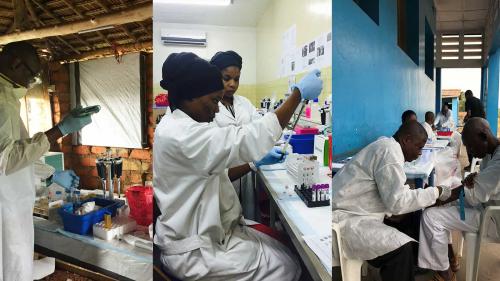Characterizing immunity to Ebola and Marburg to support medical countermeasure development

Using vaccinated and survivor populations of filovirus diseases to inform development of next-generation vaccines and medical countermeasures
Background | Project description | Project outcomes | Additional reading | Related links
Performer: University of California, Los Angeles (UCLA) School of Public Health
Principal investigator: Anne W. Rimoin, PhD, MPH
Initial contract value: $1,504,919
Contract modification value: $1,398,997 (September 2021)
Project dates: September 2019 – September 2023
Background
The breadth and durability of the human immune response to infection with Ebola virus and Marburg virus—as well as the vaccine-induced immune response in individuals vaccinated with investigational vaccines against those viruses—is not well understood. This lack of understanding can create challenges for the development of medical countermeasures (MCMs) to combat these threats.
To help address these challenges, FDA is supporting a study of the immune response in Ebola Virus disease and Marburg Virus disease survivors as well as in individuals vaccinated with investigational Ebola vaccines. This study will help the evaluation of the performance of existing MCMs while also supporting the development of next-generation MCMs.
Project description
UCLA—in collaboration with the Congolese Institut National de la Recherche Biomédicale (National Institute for Biomedical Research) (INRB)—will expand a biobank of plasma and peripheral blood mononuclear cell (PBMC) samples to help support the development of MCMs against Ebola and Marburg viruses.
The Ebola biobank will include plasma and PBMC samples from survivors of Ebola virus disease (EVD), extending back to the first reported outbreak in Yambuku in 1976. In addition, the Ebola biobank will include plasma and PBMC samples from individuals vaccinated with investigational Ebola vaccines and control participants. The Marburg biobank will include plasma and PBMC samples from survivors of Marburg virus disease (MVD) from outbreaks that occurred in 2017 and 1998. The project will also identify and collect samples from additional survivors of MVD for inclusion in the biobank. These samples will be identified through outbreak line listings, key contact interviews, and serology results of high-risk populations such as health care workers.
UCLA will use these biobanks—in collaboration with Stanford University, the National Institutes of Health Integrated Research Facility, and the University of Hawaii—to characterize the natural immunity in EVD and MVD survivors as well as the durability and correlates of vaccine-induced immunity to EVD.
Project outcomes
- Comprehensive evaluation of the anti-GP antibody response of the rVSV-ZEBOV vaccine via FANG and FRNA assay of vaccinees and control populations
- Identification of potential correlates of vaccine-induced immunity via characterization of immune profiles of vaccinated populations (using sub-cohorts from Objective 1) via Western blot, GeneXpert, Lehrer multiplex pan-filovirus assay on vaccine sub-cohorts
- Characterization of long-term (life course) natural immunity in EVD survivors via CyTOF, Lehrer multiplex pan-filovirus assay, and Elispot assay of EVD survivors
- Characterization of correlates of natural immunity of MVD survivors via Lehrer multiplex pan-filovirus assay, CyTOF mass cytometry and assessment of neutralizing antibodies via PRNT and FRNA assays
- Characterization of the durability of vaccine-induced humoral immunity to Ebolavirus and Marburgvirus
- Characterization of the correlates of vaccine-induced immunity to Ebolavirus and Marburgvirus
These efforts will contribute to the regulatory science knowledge base critical to developing new medical countermeasures, and ultimately improve prevention, treatment, and care strategies for patients affected by EVD and MVD.
This project was funded through the MCMi Regulatory Science Extramural Research program and is supported through partnership with the Defense Threat Reduction Agency.
Additional reading
- Health topics: Ebola virus disease (World Health Organization Regional Office for Africa)
- Years of Ebola Virus Disease Outbreaks: 40 Years of Ebola Virus Disease Around the World (CDC)
- Henao-Restrepo AM, Camacho A, Longini IM, Watson CH, Edmunds WJ, Egger M, et al. Efficacy and effectiveness of an rVSV-vectored vaccine in preventing Ebola virus disease: final results from the Guinea ring vaccination, open-label, cluster-randomised trial (Ebola Ça Suffit!). Lancet. 2017;389(10068):505-18. Epub 2016/12/23. doi: 10.1016/S0140-6736(16)32621-6. PubMed PMID: 28017403; PubMed Central PMCID: PMCPMC5364328
